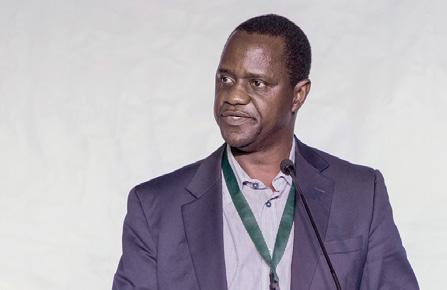
2 minute read
Foreword
In the recent past, different stakeholders have become cognizant of the distinct and growing role of microinsurance especially in responding to the vulnerabilities faced by those at the lower end of the pyramid. These are exposed to the greatest risks vis-à-vis earthquakes, floods, drought, disease and crime, yet they are the least protected by insurance. Evidence suggests a strong correlation between vulnerability and poverty, and microinsurance seems to hold out the promise of breaking a part of the cycle that ties them together. As the microinsurance agenda continues to gain ground especially in emerging markets, current issues that stakeholders face seem to oscillate around affordability and inclusiveness, simplicity and clarity in documentation, accessible processes, and building trust among target clients. In 2017 at the 13th International Microinsurance Conference (IMC) in Peru, when Zambia was announced as the next host, we were excited at such a rare privilege especially that we were going to host the IMC barely a year after our government made a gigantic, record breaking policy decision of introducing compulsory weather index insurance (WII) to beneficiaries under the farmers input support programme (FISP). This move has since seen over one million farmers covered under this WII programme. In the 2017/2018 farming season over US$ 5.86m was paid out in claims under this programme. It is such political will that will accelerate the development of inclusive insurance, particularly climate risk insurance, one of the key topics at the conference.
The Technical Advisor Group on Microinsurance of Zambia (TAG) was extremely honoured and privileged to host the 14th IMC in partnership with local partners, the Munich Re Foundation and Microinsurance Network. The conference attracted over 492 delegates from various countries and provided a platform for knowledge and best-practice sharing on making microinsurance a reality for the financially excluded. The quality of delegates that attended was exemplified in the presentations and discussions which ranged from microinsurance product development, scaling up of microinsurance to regulatory issues; insights which are contained in this publication. A key highlight of the conference was a field trip by delegates for some hands-on experience of MLife’s distribution models, micro-entrepreneurs and enterprise associations. Mlife, one of the leading life companies in Zambia, has been in partnership with the Zambia Federation of Associations of Women in Business (ZFAWIB) providing low-cost funeral insurance services since 2016.
Advertisement
The successful hosting of this event was made possible by support from various individuals and organisations. While it is not possible to mention everyone, allow me to convey my gratitude to Dirk Reinhard, Vice Chairman of the Munich Re Foundation for the unwavering belief and support, the Pensions and Insurance Authority – the regulator of insurance in Zambia, Financial Sector Deepening Zambia, the insurance industry in Zambia and all other partners who sponsored the conference. I would also like to thank the Local Organising Committee for their dedication and commitment to ensuring that the conference was successfully hosted. Let me end by wishing the organisers of the 15th IMC in Bangladesh the very best.
Shipango Muteto, Chairman of the 14th IMC Organising Committee Lusaka, March 2019
1 — Shipango Muteto, Chairman of the 14th IMC Organising Committee










